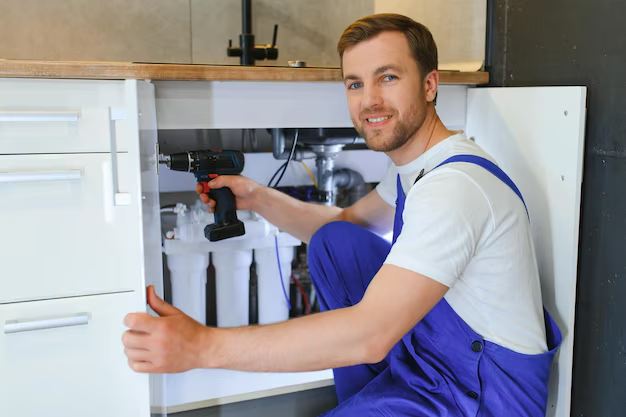Exploring Careers in Plumbing: Your Guide to Becoming a Plumber
Have you ever stopped to think about what goes on behind the scenes when you turn on your tap or flush your toilet? Plumbing, an essential but often overlooked profession, plays a crucial role in our daily lives. But what does it take to become a plumber, and what are the opportunities in this field? In this article, we'll delve into the world of plumbing jobs, exploring the skills, training, and opportunities available in this essential occupation.
Why Consider a Career in Plumbing?
Plumbing offers numerous benefits that make it an attractive career option:
- Job Stability: The demand for skilled plumbers remains consistently high due to the essential nature of their work.
- Good Income Potential: With experience and specialization, plumbers can earn competitive salaries.
- Variety of Work: Plumbing jobs range from residential maintenance to complex industrial systems.
- Opportunity for Entrepreneurship: Many plumbers eventually start their own businesses, providing autonomy and higher income potential.
Understanding the Role of a Plumber
What Does a Plumber Do?
A plumber installs, maintains, and repairs piping systems in various settings, including homes, businesses, and industrial sites. This involves:
- Installing plumbing systems in new buildings.
- Repairing pipes, fixtures, and water heaters.
- Performing routine maintenance to prevent issues.
- Reading and interpreting blueprints and technical drawings.
Specializations in Plumbing
Plumbers can choose to specialize in different areas, enhancing their skills and marketability:
- Residential Plumbing: Focuses on homes and private residences.
- Commercial Plumbing: Involves larger, more complex systems found in businesses and public buildings.
- Service and Repair Plumbing: Emphasizes maintenance and emergency repairs.
- New Construction Plumbing: Entails setting up plumbing in newly constructed buildings.
Key Skills and Attributes for Success
Being a successful plumber requires a combination of technical knowledge and personal attributes.
Technical Skills Needed
- Understanding of Plumbing Systems: Knowing the components and workings of various plumbing systems.
- Problem Solving: Ability to diagnose and resolve issues efficiently.
- Technical Aptitude: Comfort with tools and technology used in the trade.
Personal Attributes
- Attention to Detail: Ensures systems are installed and repaired correctly.
- Physical Stamina: Ability to handle manual labor and spend extended periods in various positions.
- Customer Service: Interacting effectively with clients and providing satisfactory service.
How to Become a Plumber
Educational Requirements
While formal education isn't always necessary, having a high school diploma or equivalent is often recommended. Courses in math, science, and technical drawing can be beneficial.
Apprenticeship
Apprenticeships provide the hands-on training and experience necessary to become a plumber. These programs typically last 3-5 years and involve a combination of paid work and classroom learning.
Obtaining Licensure
In many areas, plumbers are required to be licensed. This typically entails passing a licensing exam that tests knowledge of plumbing codes and practices.
Career Advancement Opportunities
Journeyman to Master Plumber
Starting as an apprentice or journeyman plumber can lead to becoming a master plumber, a title that signifies advanced expertise and independence. This is typically achieved through years of experience and further examination.
Expanding into Business Ownership
With expertise and experience, many plumbers choose to start their own business. This path can provide greater income potential and the freedom to manage projects independently.
Challenges and Rewards in the Plumbing Profession
Common Challenges
- Physical Demands: Plumbers often work in tight spaces and perform physically strenuous tasks.
- Health and Safety Risks: Includes exposure to chemicals and injury risks when handling heavy tools.
- Unpredictable Hours: Emergency repair calls can occur at any time, requiring availability outside regular hours.
Rewards of the Job
- Job Satisfaction: Solving problems and helping customers can be highly rewarding.
- Career Stability: The constant demand for plumbing services offers job security.
- Dynamic Work Environment: Every day presents new tasks and challenges, keeping the work interesting.
Exploring the Future of Plumbing
Technological Advancements
Plumbers increasingly use technology like smart home systems and green plumbing solutions to optimize water usage.
Environmental Responsibility
As environmental concerns grow, so does the demand for plumbers specializing in eco-friendly systems and water conservation technologies.
Summary: Is a Plumbing Career Right for You? 🤔
If you're considering a career change or entering the job market, plumbing offers a viable and rewarding career path:
- Steady Demand: Offers robust job security.
- Path to Entrepreneurship: Provides an opportunity to eventually start your own business.
- Diverse Specializations: Allows you to tailor your career to your interests.
Key Takeaways:
- Start with an Apprenticeship: Gain essential hands-on experience.
- Consider Specializations: Explore areas like commercial or eco-friendly plumbing.
- Pursue Licensure: Stay compliant with local regulations for more job opportunities.
In essence, plumbing is a dynamic career that combines skilled labor, problem-solving, and the potential for business growth. For those willing to dedicate the time and effort to training and development, it can be both lucrative and fulfilling.
For anyone drawn to practical, hands-on work and solving real-world problems, diving into the world of plumbing might just be the perfect career choice. 🌟

Related Topics
- A Comprehensive Guide To Cleaning Jobs
- A Comprehensive Guide To Event Planner Jobs
- A Comprehensive Guide To Graphic Design Jobs
- A Comprehensive Guide To IT Jobs: Exploring Opportunities Within The Tech Space
- A Comprehensive Guide To Journalist Jobs
- A Comprehensive Guide To Kindergarten Teacher Jobs
- A Comprehensive Guide To Librarian Jobs: Opportunities, Requirements, And Potential Earnings
- A Comprehensive Guide To Navigating LinkedIn Jobs
- A Comprehensive Guide To Pharmacy Jobs: An Uncharted Path To a Promising Career
- A Comprehensive Guide To Photographer Jobs
